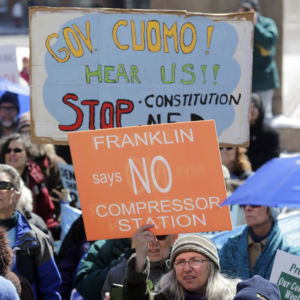Election Day, 2018 is still a long ways off, but the campaign season has begun in New York, where Governor Andrew Cuomo is being forced to defend his state energy policies in the face of attacks from his primary challengers. Actress Cynthia Nixon, who announced her candidacy last month, has already gained 16 points in the race and continues to pressure the incumbent governor about his energy policy. The criticism puts Cuomo between a rock and a hard place, since his administration is also fighting a lawsuit about the state’s authority to halt a pipeline that has already gotten the approval of the Federal Energy Regulatory Commission (FERC).
At a rally on Monday, Nixon joined hundreds of protesters outside of the state capitol to criticize Cuomo’s policies for being too friendly towards fossil fuels, saying that he had not done enough to promote renewable energy sources during his seven years in office.
“At a time when Donald Trump has pulled out of the Paris accords, we can lead not only for our own state, but we can show the nation how to lead in renewable energy,” said Nixon.
When announcing her candidacy, Nixon made renewable energy a cornerstone of her campaign, setting a goal of transitioning the state to 100 percent renewable energy by 2050 and promising to stop the construction of all new fossil fuel infrastructure. This ban would include pipelines.
Meanwhile, Cuomo has promised his plan will help the state reduce greenhouse gas emissions by 40 percent by 2030 and has proposed a second initiative to generate 50 percent of the state’s electricity from renewable sources by the same year.
The trouble for both Nixon and Cuomo may be in the details of the pipeline ban. Oil and natural gas pipelines are regulated at the federal level by FERC. While states have the authority to pass environmental protection regulations for companies operating within their borders and to issue or deny permits for energy infrastructure projects, the question of if a state can deny a permit for a project that has already gained federal approval is open.
This is the question at the heart of Constitution Pipeline v. New York State Department of Environmental Conservation, a case which has been petitioned to the Supreme Court for review. The case centers around New York’s decision to deny the Constitution Pipeline a water quality permit. The pipeline project had otherwise been approved by FERC, which had conducted its own environmental impact studies.
The state of New York successfully persuaded a district judge that it could withhold the permit as long as there was the potential for an alternate route that might be less harmful to the environment. In slightly different language, the case questions whether a state governor has the authority to enact the sort of pipeline moratoriums that both Nixon and Cuomo have discussed.
“What is really going on in this case is a tactic—spreading to other states and other pipeline applications—of creating a state veto power over FERC-designated pipelines. New York has steadfastly maintained that this is not the case because it would be so manifestly contrary to the federal statutes at issue and for that reason unconstitutional under the supremacy clause,” writes Philip Bobbitt, a professor at the Columbia Law School.
He notes that the National Gas Act was passed to create one comprehensive energy policy for the nation. New York’s denial of the permit is an attempt to reject this policy. In many cases, the Supreme Court has ruled against states who have tried to use their own laws to counter federal policies. Another wrinkle for New York is that the pipeline crosses into Pennsylvania, thereby becoming federally-regulated interstate commerce.
Even, so, the case has made observers nervous.
“If left unreviewed, this decision will serve as a roadmap for States to block the construction of FERC-approved pipelines based on a consideration–routing–that is not merely beyond the scope of the States’ power under Section 401, but is at the core of FERC’s exclusive authority under the [National Gas Act],” wrote the National Association of Manufacturers in an amicus brief filed alongside the request for Supreme Court review.
Cuomo was also dinged by the left for accepting more than $100,000 in campaign contributions from oil and gas companies, businesses working with the industry, and executives of natural gas utility Con Edison. Nixon has vowed not to take any money from the industry.
Anti-pipeline policies in New York and New England have left the area disconnected from much of the natural gas boom that has lowered utility prices across the country. During a prolonged cold snap last winter, the lack of infrastructure brought the region dangerously close to fuel shortages when short, still days pushed down renewable production and forced the region to burn fuel oil.
Correction: An earlier version of this article incorrectly identified the governor as Chris Cuomo, the journalist and brother of Gov. Andrew Cuomo.

